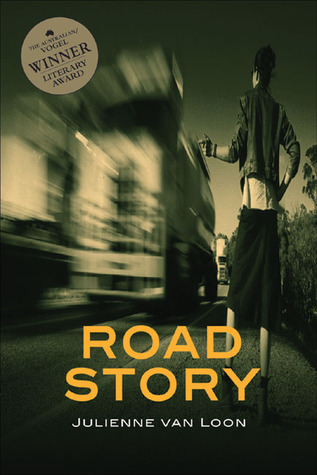Road Story by Julienne Van Loon is not a novel I would have ever picked up by free choice. I’d never even heard of it when it was given to me. And as the cover proudly proclaims, it was the 2004 winner of the Australian/Vogel Literary Award, Oz’s largest prize ($20,000) for an unpublished manuscript, previously launching the career of Orange Prize winner, Kate Grenville. So it has some pedigree, at least.
It begins, where else, but on the road as Diana Kooper abandons her best friend, Nicole, in a car crash. Without looking back she hitches a ride west of Sydney and, determined to start over, finds employment at a truckstop called Bob’s in the heart of nowhere. Serving food, stocking fridges, bantering with drivers passing through. She soon assimilates into this life but as the days go by a series of events occur (a butchered dog, an “accident”) reminds her that she has a past and it demands to be dealt with.
While I was never really convinced that Diana’s character could just leave her friend (even after the closing revelations) I was also suspicious of the time it took for the consequences of such an action to catch up on her. Perhaps that’s the way it is out in the middle of nowhere, but with people passing through all the time, surely someone had seen a news report, heard something on the radio. But it just felt like the time elapsed since car crash and closure was drawn out only to add event to Diana’s life. She does, after all, find a partner for casual sex, and develop suspicions about the depth of her new employer’s gambling habit. But other than what seems a temporal anomaly in this day and age, I couldn’t find much to grumble about.
The prose is light and pacy, perhaps too just-the-facts for my personal tastes, although it shows the occasional stylistic indulgence, and Van Loon uses this to conjure up some decent images, notably of the truckstop life:
Inside the little restaurant truckies congregate along the length of the orange laminex bar, coming and going at irregular intervals. Their conversation is scant, limited to short complaints and the occasional bad joke, which Bob immediately adds to his collection. Mouths never open all that wide. If Diana comes around the front of the bar to wipe the tables and mop the floor, she can see a whole row of boots twitching uneasily on the stool rests, knees flicking up and down, up and down, up and down. The drivers are nervous, preoccupied. This place is only ever some place on the way to somewhere else.
The dialogue is convincing, characters repeating phrases, their words short and snappy. It’s obviously a strength of Van Loon’s writing, although I did think sometimes that some characters were given vocal motifs that were used too often (Bob’s “mate”, her friend’s “you know”) but this didn’t really become noticeable until near the finish line. And the characters felt alive in their own way, whether it be Andy West, her sometimes lover, employer Bob, or, in flashbacks, Nicole. But the main focus was on Diane and while there was action in her life at Bob’s, and much musing on the nature of stories – indeed of becoming a road story herself – I found the central premise and her concern for Nicole to be the least believable aspect. Maybe I just didn’t accept her reason for running in the first place.
Road Story, however, does have much going for it. I particularly liked the notion of it, the narration feeling like someone was just sitting somewhere – at Bob’s perhaps – on the road relating it to me. It was a story of friendship, of new beginnings, both tinged with the darker worlds of drugs and addiction, and how they impact on others, but where it worked best for me was in the evocation of the truckstop life, stripping off the overalls smothered in grease and oil, and showing the lonely nature of the road and how stories connect. It was a satisfying enough read, quick like a meal you’d enjoy at Bob’s, but it was just another story on the way to somewhere else.
